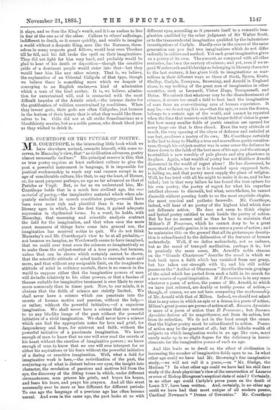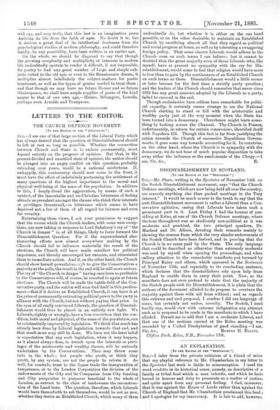MR. COURTHOPE ON THE FUTURE OF POETRY.
MR. COURTHOPE, in the interesting little book which we have elsewhere noticed, commits himself, with some re- serves, to Macaulay 's view, that" as civilisation advances, poetry almost necessarily declines." His principal reserve is this, that as true poetry requires at least sufficient culture to give the poet a powerful instrument in language, it is impossible for poetical workmanship to reach any real success except in an age of considerable culture, like that, to say the least, of Homer, or, for most purposes perhaps, an age as far advanced as that of Pericles or Virgil. But, so far as we understand him, Mr. Courthope holds that in a much less civilised age, the raw material of poetry,—the imaginative material which when ade- quately embodied in speech constitutes poetry,—would have been even more rich and plentiful than it was in those literary ages in which, for the first time, it gained adequate expression in rhythmical forms. In a word, he holds, with Macaulay, that reasoning and scientific analysis contract the field for the imagination, and that when once the more exact measures of things have come into general use, the imagination has received notice to quit. We do not think Macaalay's and Mr. Conrthorpe's view to be at all probable,— not because we imagine, as Wordsworth seems to have imagined, that we could ever treat even the sciences so imaginatively as to make them the subject-matter of a true poem, but because, unless that can be shown which certainly cannot be shown, that the scientific attitude of mind tends to encroach more and more, and that without any assignable limit, on the imaginative attitude of mind in ordinary mortals, there is no reason in the world to suppose either that the imaginative powers of man will dwindle relatively to his other powers, or that a famine of themes suitable for imaginative treatment is ever likely to recur more commonly than in times past. Now, to our minds, it is obvious that the fields of science are strictly limited.. We shall never have a science which can penetrate into the secrets of human motive and passion, without the help,— or rather, without the powerful initiative,—of a sagacious imagination. We shall never have a science that can restore to us any life-like image of the past without the powerful initiative of a vivid imagination. We shall never have a science which can find the appropriate notes for love and grief, for despondency and hope, for mistrust and faith, without the powerful initiative of a passionate imagination. We know enough of man to know that no one will ever read the secrets of his heart without the exertion of imaginative powers ; we know enough of man to know that no one will ever interpret for us either his aspirations or his fears without the powerful initiative of a daring or sensitive imagination. Well, what a field for imaginative work is here,—the revivification of the past, the conjuring-up of what is distant before our eyes, the insight into character, the revelation of passions and motives hid from the eye, the discovery of the fitting tones in which, under different circumstances, man grieves his griefs, and hopes his hopes, and fears his fears, and prays his prayers. And all this must necessarily ever be more or less different for different periods- To one age the language of a previous age has often become unreal. And even in the same age, the past looks at us with
different eyes, according as it presents itself to a romantic ima- gination qualified by the sober judgment of Sir Walter Scott, or to the transcendental imagination qualified by the industrious investigations of Carlyle. Hardly ever in the course of the same generation can you find two imaginations which do not differ radically in calibre and method. Yet each great imagination gives us a poetry of its own. The present, as compared with all other centuries, has been the century of science; and yet, even if we re- gard Wordsworth and Coleridge as belonging in literary character to the last century, it has given birth to imaginations as mar- vellous in their different ways as those of Scott, Byron, Keats, Shelley, Carlyle, Tennyson, Browning, and Arnold in England alone, to say nothing of the great men of imagination in other countries, such as Leopardi, Victor Hugo, Tourgueneff, and Heine. We submit that whatever may be the disenchantment of science, it covers too small a field to beat back the imagination of man from an ever-widening area of human experience. It may be,—we do not say it is so,—that the epic, or even the drama, belongs to a certain age of the world, and cannot be repeated when the time that seems to suit that larger field of vision is gone- Bat how many smaller fields of poetic creation are opened for every large one that is thus closed. Even the very attitude of revolt, the very opening of the abyss of defiance and unbelief at our feet, produces a poetry of its own. Mr. Courtbope certainly is the last to deny to Shelley a true and marvellous poetic creative- ness, though his subject-matter was in some sense the defiance he threw down to the faith of the best men of his age, and the attempt to establish a new worship of pale ghosts and airy phantoms in its place. Again, what wealth of poetry has not Matthew Arnold discovered in the world of regret alone ! He has discovered, he says, that religion, so far as it is founded upon supposed facts. is failing us, and that poetry must supply the place of religion. Well, he has tried with all his might to make it do so, and he has failed ; but in that very failure he has found the true sphere for his own poetry, the poetry of regret for what his superfine intellect chooses to discredit, but what, nevertheless, he cannot discredit without pouring forth to us the most exquisite elegies, the most musical and pathetic farewells. Mr. Courthope, indeed, will hear of no poetry of the highest kind which does not delineate action. He does not seem to think elegiac and lyrical poetry entitled to rank beside the poetry of action. But he has no sooner said so than he has to maintain that Milton's ll Penseroso, which he cannot deny to be a great monument of poetic genius, is in some sense a poem of action ; and he maintains this on the ground that all its picturesque descrip- tion is subordinated to the delineation of the features of human melancholy. Well, if we define melancholy, not as sadness, but as the mood of tranquil meditation, perhaps it is ; but in precisely the same sense, Mr. Arnold's noble stanzas on the " Grande Chartreuse" describe the mood in which we look back upon a faith which has vanished from our grasp, but has taken our strength with it ; and his still nobler poems on the "Author of Oberman " describe the vain gropings of the mind which has parted from such a faith in its search for a new source of equal inspiration. If II Penseroso is in any sense whatever a poem of action, the poems of Mr. Arnold, to which we have just referred, are doubly or trebly poems of action,— though, of course, we are not here comparing the workmanship of Mr. Arnold with that of Milton. Indeed, we should not admit that in any sense in which an epic or a drama is a poem of action, Milton's great poems are poems of action at all. Samson Agonistes is more of a poem of action than It Penseroso ; but Samson Agonistes derives all its magnificence, not from its action, but from its reflection. We do not in the least accept the canon that the higher poetry must be subordinated to action. Poems of action may be the greatest of all; but the infinite wealth of subjects on which imagination works in an age like ours, must sorely make up in no slight degree for the deficiency in heroic elements for the imaginative poems of such an age.
And this leads us to dwell on the effect of civilisation in increasing the number of imaginative fields open to us. In what other age could we have had Mr. Browning's fine imaginative study,—we will not call it a poem,—on " Mr. Sludge, the Medium " In what other age could we have had his still finer study of the Arab physician's view of the resurrection of Lazarus or even of Bishop Blougram's sceptical state of mind ? Certainly, in no other age could Carlyle's prose poem on the death of Louis XV. have been written. And, certainly, in no other age could we have had that most unique of all modern poems, Cardinal Newman's " Dream of Gerontius." Mr. Courthope will say, and very truly, that this last is an imaginative poem • deriving its life from the faith of ages. No doubt it is; but it derives a great deal of its intellectual freshness from the psychological studies of modern philosophy, and could therefore hardly, by any possibility, have been written in an earlier age.
On the whole, we should be disposed to say that though the growing complexity and multiplicity of interests in modern life undoubtedly operate to render it difficult, if not impossible, for poetry to find any great number of large and simple sub- jects suited to the old epic or even to the Renaissance drama, it multiplies almost indefinitely the subject-matters for poetic treatment, as well as the types of genial; needed to treat them ; and that though we may have no future Homer and no future Shakespeare, we shall have ample supplies of poets of the kind nearer to that of our own age,—Heines, B6rangers, Lowells, perhaps even Arnolds and Tennysons.



































 Previous page
Previous page